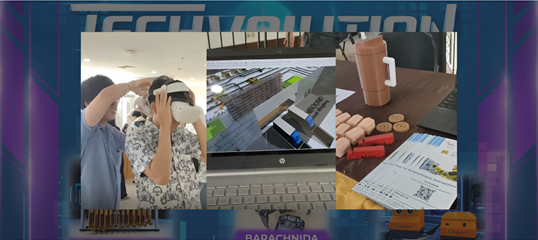Industrial Engineering – BINUS Techvolution 2025: Towards Smart City and Digital Efficiency

1. Driving Innovation Through Techvolution 2025
Techvolution 2025, organized by BINUS University, serves as a platform for student-led technological innovation exhibitions centered around the theme Smart City and Urban Mobility. Through this event, students from various study programs, including Industrial Engineering, showcase their ability to design future-oriented solutions focused on efficiency and sustainability.
In the context of Industrial Engineering, innovation is no longer confined to improving manufacturing productivity. The discipline now encompasses the design of efficient systems, facility management, and the integration of digital technologies to support urban life. Techvolution provides students with an opportunity to apply their knowledge in creating practical and impactful solutions.
2. Dynamic Facility Design Gas Station: Responsive and Efficient Facility Design
One of the most notable projects from Industrial Engineering students is the Dynamic Facility Design Gas Station. This project focuses on designing a dynamic fuel station facility aimed at optimizing vehicle flow while enhancing user safety and comfort.
From an industrial engineering perspective, this project stands out for its integration of system analysis, queue management, and facility layout design. The students sought to create a fueling system capable of adapting to varying vehicle volumes and usage patterns.
Through this approach, they applied key principles of system optimization and process improvement, which lie at the core of Industrial Engineering. The outcome is expected to deliver a more efficient and secure fueling experience, aligning with the modern mobility needs of smart cities.
3. VR Warehouse: Digital Simulation for Warehouse Efficiency
Another project featured in the exhibition is VR Warehouse, a Virtual Reality (VR)-based application that simulates warehouse operations. This tool helps users understand material flow, storage layout, and distribution processes in an interactive manner.
In industrial environments, warehouse efficiency largely depends on proper layout and effective workflow management. Through VR Warehouse, BINUS Industrial Engineering students demonstrated how concepts like Lean Warehousing and Work System Design can be visualized using immersive technology.
The application serves not only as a training tool but also as a means for logistics system analysis without the need for physical simulations. Consequently, this project offers a more engaging and relevant learning alternative in the digital age of Industry 4.0.
4. Habitron VR: Applying 5S Principles in a Virtual World
In addition to VR Warehouse, students also developed Habitron VR, a VR-based training application designed to teach the 5S principles (Seiri, Seiton, Seiso, Seiketsu, Shitsuke). Widely recognized in the industrial world, 5S serves as a foundation for cultivating an efficient, organized, and disciplined workplace culture.
Through Habitron VR, users can directly interact within a virtual environment that replicates real-world workspaces. They are guided to organize, clean, and maintain workplace order systematically.
From an industrial engineering standpoint, this project demonstrates the application of behavioral engineering and human factors within a digital learning context. By leveraging VR technology, 5S training becomes more engaging and effective, offering strong visual and interactive experiences.
5. The Role of Industrial Engineering in the Digital and Smart City Era
These three projects exemplify the evolving role of Industrial Engineering in the digital era. Industrial Engineering now functions not only within production lines but also as a bridge connecting technology, people, and urban systems.
BINUS students have successfully demonstrated that the analytical and systematic approaches inherent in Industrial Engineering can enhance efficiency across various domains—from designing public facilities like fuel stations to developing digital simulation-based training for workplace improvement.
The Smart City concept demands synergy between technology and efficiency—two fundamental aspects of Industrial Engineering. Through the use of technologies such as VR and dynamic design systems, BINUS students actively contribute to shaping the future of intelligent and sustainable urban development.
References:
- BINUS University. (2025). Techvolution 2025: Smart City and Urban Mobility. Retrieved from https://event.binus.ac.id/event/7761/techvolution-2025/
- Heizer, J., Render, B., & Munson, C. (2020). Operations Management: Sustainability and Supply Chain Management (13th ed.). Pearson.
- Sari, R. P., & Supriyadi, T. (2021). Application of Virtual Reality Technology for 5S Training in Industrial Environments. Journal of Industrial Engineering, 17(2), 45–53.




Comments :